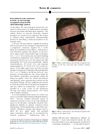Search
for
Sort by
Research
120-150 / 232 results
research Finding Parallels: Scientific Discoveries in Neuroprotection, Research Self-Efficacy, Metastasis Inhibition, Tumor Suppression, Membrane Channel Regulation, Nanoscale Deformation, and Frequency Shift Detection
Human stem cells can aid stroke recovery, research experiences boost students' career aspirations, minoxidil may reduce cancer spread, a molecule can slow tumor growth, a protein affects water flow in cells, magnesium behaves differently at tiny scales, and a new method detects slow-moving objects.

research Marie-Unna Hereditary Hypotrichosis: Case Report and Review of the Literature
Marie-Unna Hereditary Hypotrichosis is a rare genetic condition causing sparse hair growth, requiring specific recognition for proper care.

research Skin Physiology in Microgravity: A 3-Month Stay Aboard ISS Induces Dermal Atrophy and Affects Cutaneous Muscle and Hair Follicles Cycling in Mice
A 3-month stay in space causes skin thinning, disrupts hair growth, and changes muscle-related genes in mice.

research Slowly Does It
Special astrocytes improved learning and memory in rats after a stroke.

research Stem Cell Secretome as a New Booster for Regenerative Medicine
Stem cells help repair tissue mainly by releasing beneficial substances, not by replacing damaged cells.

research Are Sex Hormones Promising Candidates to Explain Sex Disparities in the COVID-19 Pandemic?
Sex hormones like estrogen and testosterone may affect COVID-19 severity differently in men and women, potentially influencing prevention and treatment strategies.

research Bone Mineral Density Is Unaltered in Women with Polycystic Ovary Syndrome
Women with PCOS have similar bone density to healthy women, but those who are obese have higher bone density at some body sites.

research Case of Autosomal Recessive Woolly Hair/Hypotrichosis with Compound Heterozygous Mutations in the LIPH Gene at c.742C > A and c.614A > G: The First Japanese Case
The first Japanese case of a genetic hair disorder caused by specific mutations in the LIPH gene was identified.
research The Nude Mutant Gene Foxn1 Is a HOXC13 Regulatory Target During Hair Follicle and Nail Differentiation
HOXC13 is essential for hair and nail development by regulating Foxn1.

research Acanthosis Nigricans and the Metabolic Syndrome
Acanthosis nigricans is a skin condition that may indicate a higher risk for insulin resistance and type 2 diabetes, and more research is needed to understand and treat it.

research Engineered Exosomes Biopotentiated Hydrogel Promote Hair Follicle Growth via Reprogramming the Perifollicular Microenvironment
The new hydrogel treatment promotes faster hair growth and better skin health for hair loss.

research Tp63-Expressing Adult Epithelial Stem Cells Cross Lineage Boundaries Revealing Latent Hairy Skin Competence
Adult stem cells with Tp63 can form hair and skin cells when placed in new skin, showing they have hidden abilities for skin repair.

research Update on the Genetics of Androgenetic Alopecia, Female Pattern Hair Loss, and Alopecia Areata: Implications for Molecular Diagnostic Testing
Genetic factors affect hair loss, and molecular testing may help predict, diagnose, and treat it.

research Cetuximab-Induced Hypertrichosis of the Scalp and Eyelashes
A cancer drug caused unusual hair growth on a 100-year-old man's scalp and eyelashes.

research Dysregulation of Grainyhead-Like 3 Expression Causes Widespread Developmental Defects
Not having enough or having too much of the protein Grainyhead-like 3 leads to various developmental problems.

research Independent DSG4 Frameshift Variants in Cats with Hair Shaft Dystrophy
Cats with abnormal hair had DSG4 gene changes causing hair problems.

research Kava-Induced Acute Cutaneous Toxicity: An Increasingly Recognized Characteristic Clinicohistologic Pattern
Drinking kava tea can cause a skin reaction with red, swollen bumps, which may improve with steroids.

research Bi-Allelic Mutations in LSS, Encoding Lanosterol Synthase, Cause Autosomal-Recessive Hypotrichosis Simplex
Mutations in the LSS gene cause a rare type of hereditary hair loss.
research Polycystic Ovary Syndrome (PCOS): An Inflammatory, Systemic, Lifestyle Endocrinopathy
PCOS is a complex condition in women that can lead to health issues, and lifestyle changes are the best management approach.

research Genetics of Structural Hair Disorders
The document concludes that over 500 genes are linked to hair disorders and this knowledge is important for creating new treatments.

research Role of the Wnt Signaling Pathway in Keratoacanthoma
The Wnt signaling pathway is not a major factor in the development of keratoacanthoma, a type of skin tumor.

research Biocompatible Nanoparticles and Vesicular Systems in Transdermal Drug Delivery for Various Skin Diseases
Nanoparticles improve drug delivery through the skin but more research is needed on their long-term effects and skin penetration challenges.

research Detection of a Novel Missense Mutation in Atrichia with Papular Lesions
Researchers found a new mutation in the HR gene linked to a rare hair loss condition.

research Studies of Normal Moult and Artificially Induced Regeneration of Pelage in Peromyscus
Artificially inducing hair regrowth in mice can change the normal pattern and timing of hair growth, with minimal color differences between old and new fur.

research Activator Protein-1 Activity Regulates Epithelial Tumor Cell Identity
Inhibiting AP-1 changes skin tumor types and affects tumor cell identity.

research Whole-Genome Sequencing of Eight Goat Populations for the Detection of Selection Signatures Underlying Production and Adaptive Traits
Researchers identified genes linked to coat color, body size, cashmere production, and high altitude adaptation in goats.

research Intradermal Injection in Balding Region Versus Intramuscular Injection in Surrounding Muscles: A Split-Scalp, Randomized Trial on Botulinum Toxin for Androgenetic Alopecia
Intramuscular injections improved hair density more than intradermal injections for treating hair loss.
research Mast Cell Hyperplasia in the Skin of Dsg4-Deficient Hypotrichosis Mice, Long-Living Mutants of Lupus-Prone Mice
A gene mutation in mice causes increased mast cells and disorganized hair follicles in their skin.

research Skin Cell Heterogeneity in Development, Wound Healing, and Cancer
Different types of skin cells play specific roles in development, healing, and cancer.